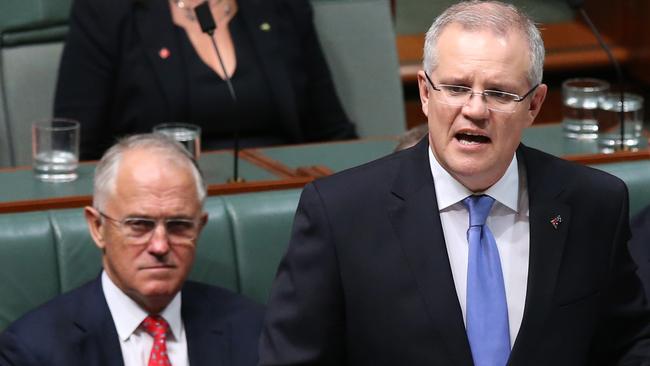Coalition’s company tax cuts plan will not survive after federal election
WE have the Government campaigning on a company tax cut policy that has no hope of being implemented if it wins, writes Terry McCrann.

Terry McCrann
Don't miss out on the headlines from Terry McCrann. Followed categories will be added to My News.
TREASURER Scott Morrison’s first Budget had two centrepieces — the proposed changes to superannuation and the 10-year program of company tax cuts.
There’s now a huge question mark — at best — over the first and the second is already dead, buried and cremated, in the famous words of a former prime minister.
It is now clear that the best the Government can hope for is a narrow win in the lower house. Another “hung parliament” or even a Labor win are very real possibilities.
Indeed, I personally think the latter is a big probability.
But whatever, the Government has absolutely no chance of getting anywhere near a majority in the Senate.
Indeed, Malcolm Turnbull’s “inspired” — if not exactly a good — idea at the time, of forcing a double dissolution election will deliver the balance of power in the Senate to the Greens and “Palmer Mark Two” — Nick Xenophon and his certain team of three.
Or alternatively, the balance of power will be held, just as it was in the old Senate, by them and a gaggle of mavericks, some old, some new.
If Tasmania’s Jacqui Lambie was PM Turnbull’s worst Senate nightmare in the last Parliament, how would he fancy her and Queensland’s Pauline Hanson in the next?
With Labor and the Greens absolutely against the company tax cuts, there is no hope of them getting through the next Senate.
So we have the Government campaigning on a policy that has no hope of being implemented if it wins — but at the same time could be a big reason why it loses. You have to say, that’s a very special kind of political stupidity.
It was very different with the GST. Back then we at least had a pre-Greens Senate where the late Australian Democrats were the major minor party and could be reasoned with. Even though it turned into an exercise of harakiri for them.
It’s the same with the super. They directly attack the Government’s base, but they haven’t won much applause from the voters in the middle. They also have little prospect of being implemented whether the Government wins or loses.
Although, ominously, they have opened the door to big new taxes on super.
This is all a direct consequence of the election timing — it meant that for the first time, or at least in the last 50 to 60 years, we literally got “an election Budget”. The Budget was “put on hold” for the election; the election would determine whether it went anywhere.
Now Morrison tries to argue that this is precisely the best time to announce big policy proposals — so voters can make their judgment.
That’s just nonsense. By all means allow voters to vote on the proposals, but they should be voting on proposals that have actually gone through a proper assessment in both functional and political terms.
On the one hand it would have been far more politically astute to have limited the tax cuts just to small and medium-sized businesses.
The rate could have been cut to 25 per cent for all businesses with a turnover of, say, $50 million or less, at much more reasonable cost and done so within the normal four-year Budget timeframes.
This would have avoided “giving” the Opposition a $50 billion (over 10 years) bucket of money to promise to spend on health and education, while also depriving it of the politically slick line that the Government was giving all this money to wicked multinationals.
Indeed, that is precisely the — totally desirable — reason for the tax cut: to attract foreign investors to come to Australia rather than go to other low-tax places. But that is also precisely what the Government doesn’t dare argue in the white heat of an election campaign.
The other plain (half) truth — again, which the Government can’t concede — is the company tax cut doesn’t really deliver anything to local companies because of dividend imputation. What the company gets, its shareholders lose.
That’s only half-true, because a tax cut does boost the company’s cash flow; it doesn’t have to be paid out in immediate dividends.
As for super, it should be blindingly clear that the proposals are riddled with so many “unintended consequences” they will have to be revised substantially. That’s if it doesn’t help send the Government and them both into history.
In both cases, in short, an election campaign was precisely the wrong time to unveil them. And far from delivering certainty, the Government has massively multiplied it.
We now know that super will change after the election. Or do we? But if so, how will it change? And the same goes for company tax. But the single worst criticism is that Morrison’s DOA Budget has made a “hung parliament” that much more likely.
Originally published as Coalition’s company tax cuts plan will not survive after federal election


